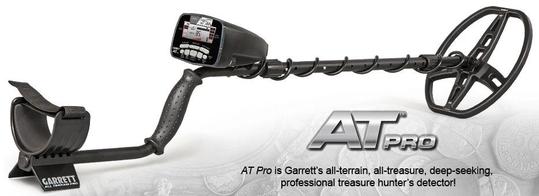Are you excited to get started metal detecting for coins?
For many people, the enjoyment of an activity such as metal detection comes from the thrill. The ability to be able to look around, to find something unique, and to grab a piece of history. The desire to do this kind of thing, this kind of discovery, has been strong amongst metal detecting hobbyists for a long, long time.
That’s why, if you wish to get into metal detecting, you need to know what you will be searching for. For example, have you ever thought about getting involved in using a metal detector for finding coins?
Metal detecting for coins is a major part of the hobby today. With so many coins scattered around the world, this should come as no surprise.
Guide to Metal Detecting For Coins
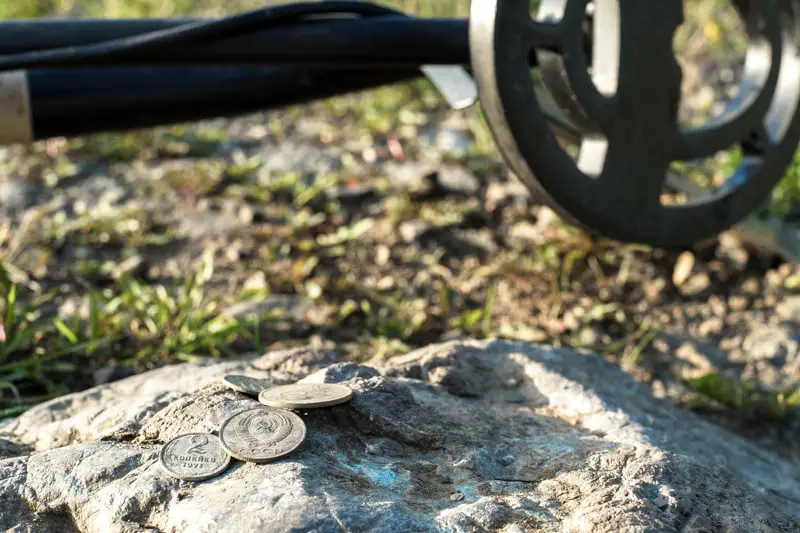
Coins are a major part of the process, and it’s a big reason why many start getting involved with metal detecting. After all, finding a coin is a pretty special discovery! It’s the kind of thing that can leave you feeling very positive indeed!
At the same time, though, metal detecting for coins isn’t easy. Far from it, in fact. It’s something that often takes a huge amount of work, effort, and often a little bit of luck. If you want to make sure that you can enjoy the process of metal detecting for coins, then, you should start.
In this beginner’s guide to metal detecting for coins, we’ll try and break down the most important parts of getting involved. This should help you to put together a solid list of metal detecting solutions. That should help you in making sure you can get the process up and running.
So, if you want to enjoy metal detecting once again, what’s the best way to go about doing so? What works best?
Is metal detecting for coins worthwhile?
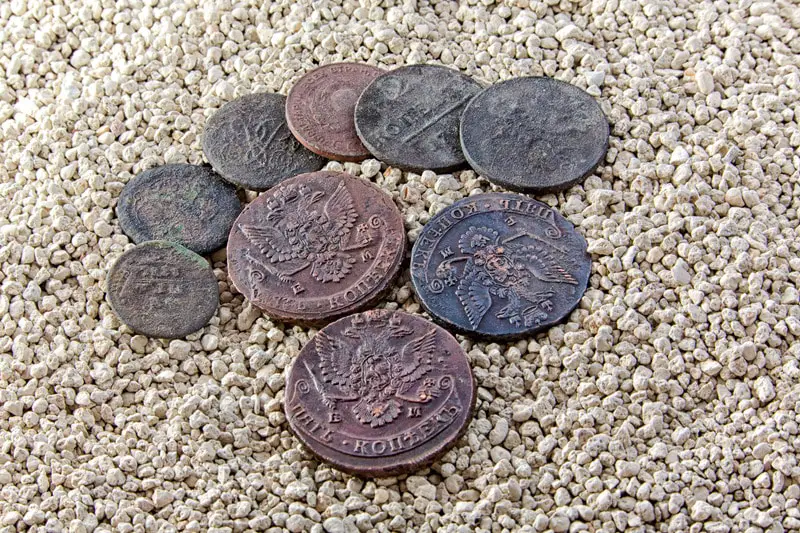
Absolutely! Few other forms of metal detecting are quite so likely to produce rewards as looking for coins. Metal detecting for coins can take a lot of work, and it can mean putting in the effort to make sure you find them.
But when you do find a coin that is from a more unique era, the results can be magnificent. By searching for coins in the right places, you have the chance to make a fair amount of money through your discoveries.
The main challenge that you can find when it comes to metal detecting is making sure you have the right kind of equipment. We’ll break down that kind of information below.
But for now, we want to focus on making sure you can understand why metal detecting for coins is a worthwhile endeavor to get involved with.
Many stories, new and old, exist of people making a lot of money through metal detecting. Indeed, a recent article in The Times showed that metal detecting hobbyists have enjoyed a ‘bumper year’.
Other great stories exist of people finding historically valuable items. Including coins used by royalty and the rich and famous of the recent and long-term past.
Indeed, a fine example of what you could make from this kind of endeavor comes from London. A rare silver penny was found, and it has been sold for a massive amount of money – with an estimated price of around $19,500!
That’s an incredible finding and shows you how much you could make if you find the right kind of product. And while there are some rules about what you find and where you find it, we’ll try and break all that down for you below. You’ll feel much more prepared to get involved!
What do I need to go metal detecting for coins?
So, the first thing that you should try and work out is what kind of items you would need to use when metal detecting for a particular kind of coin. Let’s take a look at what kind of items you might need, and why you should look to make sure you have the following items:
-
A metal detector. You need something that is suited to getting a coin detection frequency, but we’ll break down some great options for you below.
-
A pair of headphones. Headphones make an excellent pick-up as you will need them for hearing frequencies that your detector creates.
-
Comfortable clothing. We recommend wearing attire appropriate for where you will be searching. But also bring a pair of windbreaking clothing such as a jacket and tracksuit bottoms.
-
Quality shoes. If you are down by the beach, make sure you wear shoes that won’t be letting sand in. If you are on the more temperate ground, be sure to wear boots with plenty of grip included.
-
A digging tool. We recommend having a spade and also a hand trowel or something similar. This should allow you to dig deep into the ground and excavate whatever you have found.
-
A pinpointer. This is not something everyone needs, but it can be extremely useful for boosting the accuracy of your finds. Especially when looking for something small like a coin!
So, the above items should go a long way to making sure you can pick up a high-end metal detecting solution. this can be used to help you get started and ensure you can start finding coins. Also, look into getting a GPS phone app.
How much does a good metal detector cost?

Good question! It comes down to the kind of metal detector that you want to buy. We’ll break down five of the best options for coin detection in just a moment. For now, though, we want to focus on making sure you understand that the price matters.
A low-cost detector is something we recommend buying if you are very limited on your budget and want to see if metal detecting if for you. That being said, you can often hire/rent a higher quality detector and see the true power of these devices.
Using something low-end can make it easy for you to feel like you aren’t getting any progress or enjoyment from the experience. With that in mind, we recommend that you look at buying something beginner-friendly that is a decent price.
So, which are some of the best models on the market today? What should you expect if you were to go and buy a metal detector?
You might find that buying a good quality metal detector takes more effort than you might have assumed. With the beginner list below, though, it should be easier to make a decision.
1. Fisher F22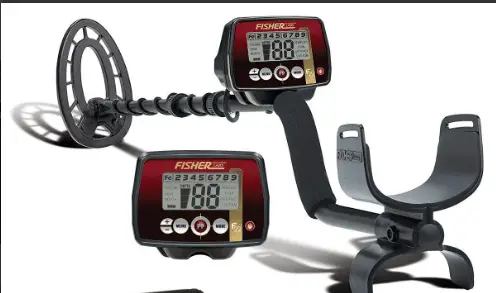
The first place we would recommend most people to start with a budget would be the Fisher F22. The F22 has gathered a lot of interest in the last few years, has become a very popular mid-range choice.
It’s affordable, and it’s reliable. If you are looking for a metal detector that you know you could use for any particular purpose, be sure to start here.
The large screen that this provides makes reading the numbers so much simpler, while the overall style of the Fisher F22 ensures that you can work without too much stress.
One thing you might find with this model, too, is that it’s one of the easiest to carry around with you inconspicuously.
Other models can feel like you are carrying something excessive in size around with you, but this is a model that you should be able to get to grips with relatively easily.
While it might have some limits as you get more experienced, for beginners the Fisher F22 is a fine starting place for most people. It’s also one of the most affordable, making it a fine entry-level option.
2. Garrett AT Pro
A quality mid-range metal detector and should be useful for more or less any metal detecting journey that you go on. The reason why is quite simple; the Garrett AT Pro is a device that has plenty of power in it.
It should be more than suitable for all kinds of terrain. So you don’t need to worry about it not handling grass or anything like that.
With the AT Pro, you will be paying a pretty penny for a good quality detector. Once you own one, though, the quality that it provides should become worthwhile. It’s a quality solution if you want something that you know you could use for every trip that you embark upon.
Few things are more annoying than trying to use a metal detector, only to find out that it does not suit where you intend to go hunting.
Some detectors are more suited to certain kinds of terrain. This should give you a better option of what you are dealing with. Be sure you look to get something like this. As metal detecting for coins needs something that can handle more than one kind of terrain due to how well-spread coins can be.
3. Garrett Ace 300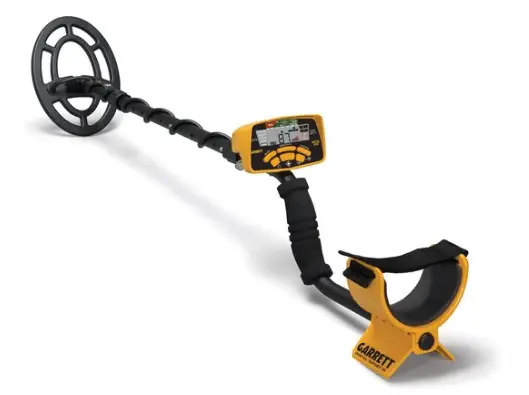
Another fine model to start with would be the Garrett Ace 300. One reason why a beginner would love this particular model is just how durable it is. If you are looking for a metal detector that you know isn’t going to let you down, then the Garrett Ace 300 is a fantastic starting place.
It’s been one of the most commonly sold metal detectors around, too. Given the fact it’s a Garrett model, that should be no surprise; Garrett is one of the most reputable names in the entire industry.
They have a fine range of high-end options for you to pick from. Making it nice and easy for you to choose a model that suits your needs. It’s also a good choice for anyone who would like to keep their first interactions with metal detecting quite simple.
It’s good for you when you are looking for a starting place. While more experienced users might tire of its simplicity, for metal detecting for coins it would make a fine choice. The ease of use, and the lightweight style. The professional standard that it provides makes this a most excellent starting place.
4. White’s Coinmaster Pro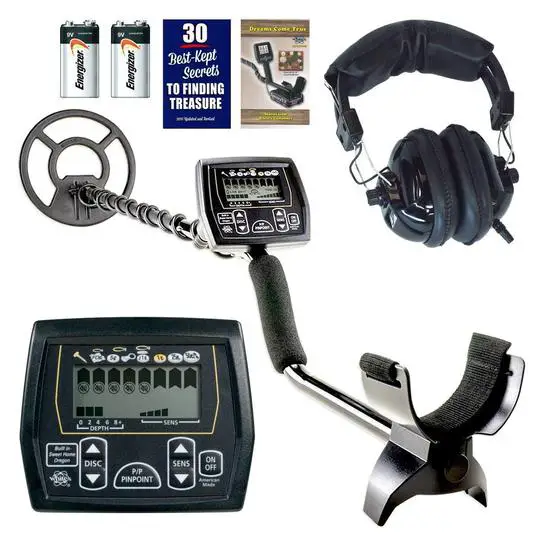
If your sole aim of being a metal detection hobbyist is to find old-school coins, then this makes an excellent place to start. It’s a highly durable, effective model that can give you unique audio tones based on what you have found.
This also allows you to know what you are finding – many times, we can dig, dig, dig and only come away with a very generic, basic item.
The Coinmaster Pro, though, changes that quite significantly. This particular model is going to give you a unique beep sound based on just how useful an item is. For beginners, this can help you to avoid wasting valued time, energy, and space looking for an item that is not worth anything.
The more desirable and high value an item, though, the more notice the Coinmaster can provide. This allows you to easily find high-end items that give you the perfect place to start. They are going to probably be the best model types to go for.
Without a doubt, an item like this can be just what you need for a simpler, easier solution. For a beginner looking for a hand-held approach to coin management, be sure to try out the Coinmaster Pro.
5. Bounty Hunter Tracker IV
If you are a younger person, or you have a child who wants to get into metal detecting for coins, begin here. The Bounty Hunter Tracker IV easily makes the best starting place for a youngster.
It’s going to give you all the help that you need to make the process easier. Ensuring you are left with a simple tracking device that allows for younger children and teenagers to get involved.
If you are looking to start up a parent-child hobby, buying a Tracker IV for them to use is better than letting them use your model. You could pair this up with any of the models we have mentioned above and have a great little tracking team that you can work with.
It’s going to help you and your child to enjoy the experience a bit more, giving you a much more satisfying opportunity to take part in.
That’s why we highly recommend you look to use the Bounty Hunter Tracker IV if you are new to metal detecting. For a youngster, you would struggle to find a more reliable option to start your hobby with.
Keeping the coils in mind
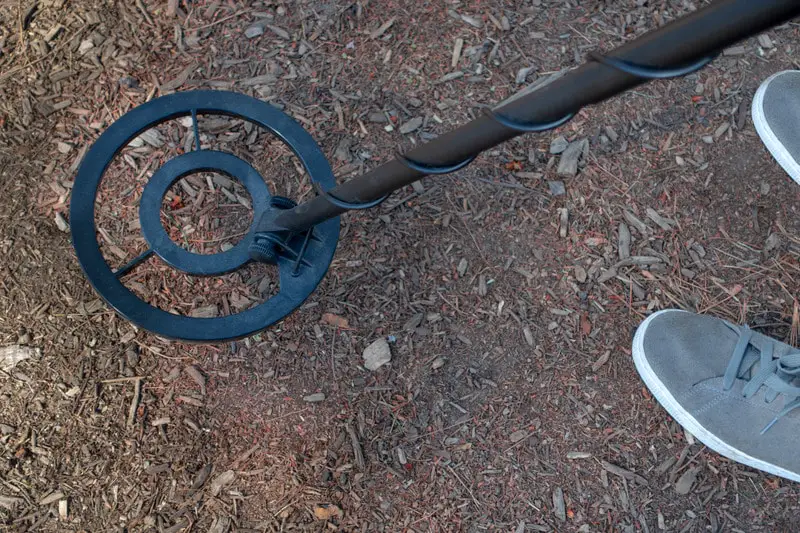
As you review all of the above options, one thing that we ask that you keep in mind would be the coil selection. A metal detector that has multiple coils is a good idea, and most of the above should have alternatives that you can use. Coils are useful, as you might want something like a Double D coil.
These tend to be smaller and more useful for finding specific items. Otherwise, you might wish to go for something like a concentric coil. It really depends on what you are looking for, though!
Things like the ground mineralization (more on that below) and the amount of garbage in the local area will determine what kind of coil you need. For coin hunting, in particular, we recommend that you keep a particular focus for concentric coils. These are more suited to pinpointed targets, which is what you will be doing if you are looking around for coins.
Avoid Analysis Paralysis
Another quick thing we want to mention – are you looking at every potential option and finding it hard to choose what model works best for you? No problem. We understand that. The last thing that you want to do, though, is simply sit, and let the analysis paralysis take over.
Don’t get too hung up on the specifications on a machine. As long as you aren’t buying an advanced level metal detecting device, you shouldn’t need to worry *too* much about this information.
So long as you buy from a major brand like White’s, Bounty Hunter, or Garrett, you should get a decent enough end result. Yes, it can be tough to make a call and to buy something that is suited to your needs.
However, at the same time, you can find that buying something based on the information available and through user reviews can give you a good idea of what you are dealing with.
As ever, you should look to find something affordable and accessible. You can then swap it out for something a bit more high-end when you know you actively enjoy the experience.
Looking out for quality coins
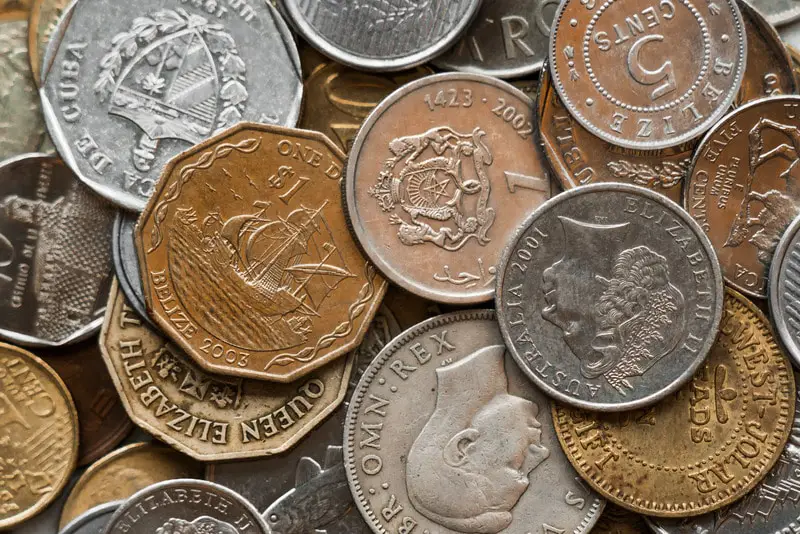
Now that you know what kind of model to buy, the next thing we want to look at is making sure you understand what kind of coins you should even be looking for. As a beginner, you should try and keep the following factors in mind:
-
Metal detecting for coins is going to come down to buying a good quality metal detector. All of the above should make your job easier, but don’t assume these are your only options.
-
For coin hunting, though, we recommend that you try and avoid anything sold as a ‘gold hunter’. These are often aimed at those looking for things like gold nuggets and jewelry.
-
The one thing you need to make sure you have is a metal detection solution with a proper frequency. Older coins need to be able to ID targets of around 6” or greater in size.
-
Keep in mind that older coins tend to retain their value better. This means that an older coin should be worth more, but is likely to be further submerged – meaning more searching and digging.
-
In terms of operation frequency, we always recommend that you look for a model that has a lower frequency. Something in the 2-4 kHz range should be suitable for what you need.
- For coin hunting, though, we recommend that you try and avoid anything sold as a ‘gold hunter’. These are often aimed at those looking for things like gold nuggets and jewelry.
-
The ease of use, and the lightweight style. The professional standard that it provides makes this a most excellent starting place.
-
This is why we recommend looking at models that come with variable and multiple frequencies. Many models can offer you something known as Full Band Spectrum.
-
However, anything with FBS is likely to cost you a fair amount of money – far over any of the above-listed models. As such, you should factor that into your decision making.
Does the terrain matter when metal detecting for coins?

Yes, the ground will play a much bigger role than many would assume. For example, if you are working with a low-end detector and you are on the ground with high iron and salt values, your detector might start picking that up.
We recommend that you look for a model that allows you to automatically adjust the balance to the ground conditions you will be searching on for the day.
This is very important, as the terrain is a major factor in making sure you can get the right kind of results. If you are working with the wrong ground balance, it means that you are going to be both picking up needless results and skipping over good quality finds. Naturally, we want to avoid that!
So, what should I do now?
We recommend that you look to use all of the information above and make an informed choice. This should give you all the help that you need to make the right call. You now know what you need, what kind of metal detector you require, and what other items you might wish to bring in.
It’s all about making a wise choice. The information about should make that wise choice a little easier to come by. So, where should you start? It’s entirely up to you, but we recommend using all of the information above to make metal detecting a little easier for you.
If you have any questions or comments please leave them in the comments section below. I would love to hear from you. Until next time Happy Treasure Hunting!
